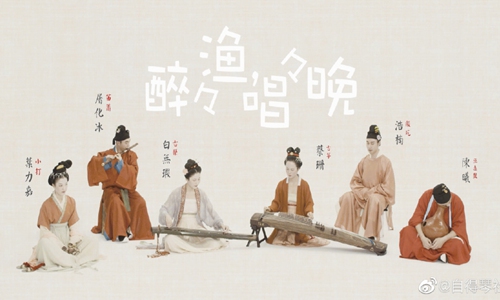HOME >> ARTS
Young Chinese make traditional Chinese music and instruments popular again with stylish music videos
By Ji Yuqiao Source:Globaltimes.cn Published: 2020/2/24 0:15:10

Photo: Courtesy of Zi De Guqin Studio
A group of young Chinese are trying to breathe new life into traditional Chinese instruments such as guqin by innovating on China's traditional culture through uniquely styled music videos.
Zi De Guqin Studio, made up of dozens of Chinese in their 30s and 20s, has gone viral on social media and video platforms with stylish music videos in which all the songs are played using traditional instruments. The biggest star so far has been guqin, a plucked seven-stringed instrument, that has been the centerpiece of each video.
The videos produced by the studio are notable for their atmosphere.
They all feature the musicians dressed in attire appropriate to the history of the piece and instruments, such as the Tang Dynasty (618-907) for a song about that period, against a simple warm yellow-colored backdrop.
Numerous netizens from China and elsewhere have been captured by the unique style of these videos, regarding them as feasts for both the eyes and ears.
"One Japanese netizen left a comment on our YouTube channel that said, 'I'm glad to see the teacher of Japanese culture return.' This was the biggest compliment for us as it shows that viewers can see the real traditional Chinese culture that is in our music," Tang Bin, a music producer at the studio, told the Global Times on Sunday.
Traditional charm
This is not the studio's first foray into traditional music. Previously, the studio wrote the theme song "Chang'an Fantasy - Ghost Patrol of Ancient China" for the online game Chang'an Fantasy. In a music video for the theme song, the performers look like they could have stepped right out of the Tang Dynasty.
The female musicians playing guqin and guzheng, another kind of plucked string instrument, wear small-sleeves coats, long skirts and wide scarves, which are the traditional style of the dynasty. Drawn small flower-shaped marks between their eyebrows make them delicate and charming.
Tang noted that in the online game, since there are five tribes that span its virtual world - wind, forest, fire, mountain and yin (the female aspect of yin and yang) - he chose five instruments with unique tonal qualities to represent the characteristics of each tribe.
"Guqin is most like the mountains, while guzheng's sound is sonorous and like an echo in the forest, so I used guqin to represent the mountain tribe and guzheng to describe the forest tribe. Fire is the most violent and so it is the drum. [African] voodoo drums sound the weirdest so they represent the yin tribe," Tang explained.
Tang told the Global Times that since the studio is also a guqin training center, they choose that instrument to be the "lead character" in all their videos.
Guqin is a valuable ancient musical instrument in Chinese music that has lasted for thousands of years. It is one of the oldest plucked instruments in China.
Although more than 3,000 guqin songs have been handed down from ancient times, due to the way music notation worked in China only a few can be played with any certainty that they sound as they did back then. It takes a lot of time to "recompose" the music of the past into notes that can be understood by contemporary people, Tang noted.
"I think the most unique characteristic of guqin is its timbre," Tang added.
When playing guqin, the artistic conception is distant and quiet, like talking to ancient people while sipping tea in the mountains or besides a river.
Besides traditional Chinese instruments, Tang has also added African voodoo drums in his works. The drum from Africa is made from pottery jars and is suited to play music that evokes a sense of mystery.
"We are producing music that we prefer instead of what audiences like. This is our interest," Tang said.
"We not only restore traditional music but created a novel style, combining old school with creative form to have fun."
Future of traditional Chinese instruments
"The popularity of traditional instruments such as guqin in China is so low," Bai Wuxia, a guqin player at the studio, said.
"This means finding a professional guqin teacher is very difficult."
Bai said that many people can tell if a person plays piano well after listening to one song, but few people have an ear for traditional instruments, "so they are usually cheated [out of a good teacher]."
"What we do, whether recomposing traditional music or dressing up as ancient people, is to improve the popularity of these traditional instruments and get more young people interested in them, which might lead to a higher level of public appreciation someday," she added.
"These children will soon grow up. If they are exposed to this type of good music and the sounds of the instruments, they will be able to judge traditional instruments better."
Bai noted that if audiences in the future are more demanding when it comes to quality, there will naturally be better performers.
"China has lost many beautiful things. Getting back our cultural confidence and passing it on is the most significant thing that young Chinese people can do," said Tang.
Posted in: MUSIC